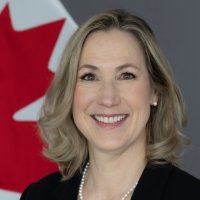The United States and Canada: Outlook for Bilateral Relations in 2021
With the presidential election decided and the Biden administration beginning to plan its agenda, the Canada-United States relationship will be an important area of focus. Once one of the strongest bonds among neighbors and deeply committed allies in the world, the relationship hit low points over the past four years. Tariffs, justified as necessary for national security reasons, were put in place in spite of successfully negotiating a new trade agreement. Further, our countries have taken divergent approaches to relationships with China, European Union member states and multilateral organizations such as NATO and the World Trade Organization (WTO).
The Canada Institute and Canada-United States Law Institute welcome Canadian Ambassador to the United States, Kirsten Hillman, who will set forth her assessment on the prospects for US-Canada relations following the U.S. general election. Her keynote address will be followed by a panel discussion with former diplomats, business leaders, and journalists who will weigh in on the future Biden administration and the 117th Congress.
Ambassador Kirsten Hillman
- "[Prime Minister Trudeau and President-Elect Biden] share strong policy objectives: not only specific policy objectives. [T]he view that both countries should be working together with allies to make things better not only within our own countries but global around the world."
- "[The COVID-19 pandemic] has exposed both strengths and vulnerabilities in some of the systems of governance we have... I have no doubt that we will be reflecting on this experience and the lessons learned from this year for years to come. Some of that reflection has already started."
- "We've developed, over the past three or four years, a common understanding of our bilateral trade relationship through the NAFTA renegotiations. That's great; that's particularly great in the face of a crisis when you're not sure who you can rely on... We were able to demonstrate that, in a moment of crisis, we were one hundred percent there for each other."
Lauren Gardner
- "[The Keystone Pipeline's future] doesn't look great. I don't know why President-elect Biden would renege on that campaign promise. I don't believe he said that's a Day-One priority, so unlike President Trump, I don't think we can expect anything on Keystone right out of the gate."
- "[The border will reopen] when COVID cases go down: not any time soon... The Prime Minister himself has said that [it] isn't going to reopen until things are in withdrawal, in both countries at this point."
- "As President-elect Biden looks to get the US back into the Paris Agreement, perhaps there is an opening there for the US to work with a country like Canada to figure out... how to, as a continental unit, bring down our carbon footprint."
Alex Panetta
- "Of all the issues that involve Canada and the United States, the one issue that I have had the hardest time getting anyone in Ottawa to talk about is anything having to do with Huawei and Meng Wanzhou... It's a black box in Ottawa: they're not talking about the two Michaels and how that may or may not be connected to the Meng case."
- "The most important thing to figure out as vaccines start to roll out is harmonizing rules for [a] standard of proof: do you need to have been vaccinated to cross the border. That opens up civil liberties issues and equal protection issues... I don't suspect it will be a bilateral issue so much as two domestic political debates happening simultaneously."
- "We will have a fairly decent idea of which way Buy American is going relatively soon, I think. If the Trump administration withdraws from the WTO agreement on procurement over the next few weeks... that might box in the Biden administration relatively early on."
James Blanchard
- "Congress needs to pass not only a new stimulus and COVID relief plan, but it really has to include revenue for states and local governors. We keep forgetting that, because of COVID, they now have... a complete drop in revenue: income taxes, business taxes, gas taxes. Their budgets have been totally decimated, and if they don't get federal relief from Congress soon, they will be laying off teachers, police, and healthcare workers."
- "Without a [US] economic recovery, Canada is not going to have a recovery... The impact of the US economy on Canada is enormously substantial, so Canadian should be hoping for decisive relief from Congress."
Charles Dent
- "I look at this election as a repudiation both of Donald Trump and of the left-wing of the Democratic Party. Many people were tired of Trump but were not comfortable with that far left-wing: they felt Joe Biden represented a center-left perspective and that he was acceptable, but they wanted to place a little bit of a check on him too."
- "I'm hoping that the Biden administration will develop some nuance [on trade policy] and, for a variety of reason, I believe that [they] will behave in a much more multilateral manner: that they will not embrace the America First agenda."
Introductions



Keynote Speaker

Moderators


Panelists



Partner and Co-Chair, Government Affairs Practice Group, DLA Piper; Former U.S. Ambassador to Canada

Hosted By

Canada Institute
The mission of the Wilson Center's Canada Institute is to raise the level of knowledge of Canada in the United States, particularly within the Washington, DC policy community. Research projects, initiatives, podcasts, and publications cover contemporary Canada, US-Canadian relations, North American political economy, and Canada's global role as it intersects with US national interests. Read more

